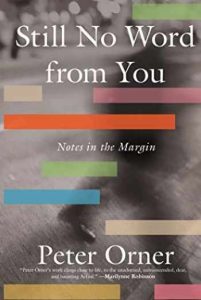Reviewed by Camryn Haag

Ask anyone, and they would probably tell you that the purpose of prose is to tell stories. It has always been this way. Authors create new, original stories, inspired by history or social issues or maybe even their own lives. True significance is founded in the connection of the writer to the message, and true purpose is created in the connection of the reader to the work. Stories do not exist independently from us, rather they exist within us. In the pages of Still No Word from You, Peter Orner unearths our shared existence through his meditations on literature. Each essay deserves to be read carefully, to be read with the same intentionality with which Orner ruminates upon the significance of life’s mundane experiences. He chronologizes his life through characters and words, but it is more than an anecdotal narrative. Orner’s essays transcend the boundaries of personal memoire, and he tells a story about humanity with such intimacy you wonder whether he catalogues your own life in the pages.
Morning. Still No Word from You begins in the early stages of life, in the morning. Through the 107 chapters, the stories develop towards maturity with the six different sections labeling time. The vivacity and uncertainty of youth fill the first few as Orner recounts many events from his childhood, his complicated relationship with his father, his compassion for his mother. In morning, Orner bespeaks the nuances of naivety and dependence that find a home in adolescence, and how this past has a way of staying with us even when, “The house is gone, flattened, bulldozed, and we’re still trying to make it through dinner.” The disharmony of family, the strained dinner, these personal moments find their way into the pages and the heart of the reader.
Mid-Morning. These are the stories where we find our footing, where we begin to understand the world and our place in it. Everything is on the precipice. Orner begins to give glimpses into the complex relationships of the characters, his family and friends. His mother is robbed by his father, his grandma would not write back to his grandfather, his English teacher would not accept late essays; at times, these stories blur into what feels like some unlived but familiar memory from my own life. Orner finds himself in a similar position to my own, drawing up memories of his own family from the characters in different prose, and in doing so, highlights the significance of literature in the stories of our own lives.
Noon. There is a certainty during midlife. We now have words to describe our emotions and thoughts and place in the world. It is midday, transparent and bright, and we can finally see clearly. Orner’s stories become more comprehensible and the meaning more apparent. He conveys the isolation that comes with adulthood, and the longingness for someone to understand, conveyed in James McPherson’s Gold Coast, and the empty space of people long gone, in Etheridge Knight’s poems. We learn the inevitable lack that forms between two beings and the space that can never be filled between Orner and Naomi, but we also learn the importance of the small moments of connection when admiring a mountain in Lorraine Hansberry’s play. It’s these familiar moments that Orner describes in the glorious light of midday.
3 P.M. By now, Orner and the audience has become acclimated to adulthood and the droning that comes with it. In the 3 P.M light, we come face to face with the first rays of acceptance, the reckoning of Orner’s anxieties about his father. We begin to understand the true nature of life and loneliness, of being deprived of momentum while the world around us keeps moving. A place where Malamud’s Isaac in Idiots First must leave Mendel behind. Orner points out the difficult truths: the inevitable loss of excitement in love, the inevitable end of being forgotten, the inevitable regret of what cannot be relived, that life’s moments can be mundane, but the past and the present live and exist simultaneously.
Dusk. Orner describes to us that we are who we always have been, and we finally accept our shortcomings. There’s a ripping of the heart, but also a quiet and unavoidable acceptance of this heartache as a condition of life. Orner creates a sense that literature ages alongside us. He recounts Bernadette Mayer’s free-flowing, unrelated thoughts in Midwinter Day and ruminates on his current life, that, “everything I’ve squandered encloses me like a fist.” In each chapter, Orner writes stylistically similarly to the authors he speaks of, deepening the significance of literature into his own life. Orner finds himself in other stories, he bathes in the twilight of regret, and invites others to bathe there with him. You can find yourself within these stories and repose in the comfort of Orner’s curt truth.
Night. You can feel age, knowledge, understanding, and loneliness as the paper stack accumulates under your left thumb. We grow old in Orner’s night, we accept all that has been and all that is still yet to come. We get tired of ourselves, and begin to understand that “Minor characters don’t know they’re minor, until they do” and Orner asks us, “And doesn’t this, at some point, include us all?” We will face times where we do not have many lines in the play, but as Orner realizes, this is just a facet of life that we all must live. He finds significance through prose, and bequeaths the gift of his meditations to readers, so they too may feel understood. In Still No Word from You we embark on the journey of youth and the past to the destination of wisdom and the present, the journey we all make from morning to night.
